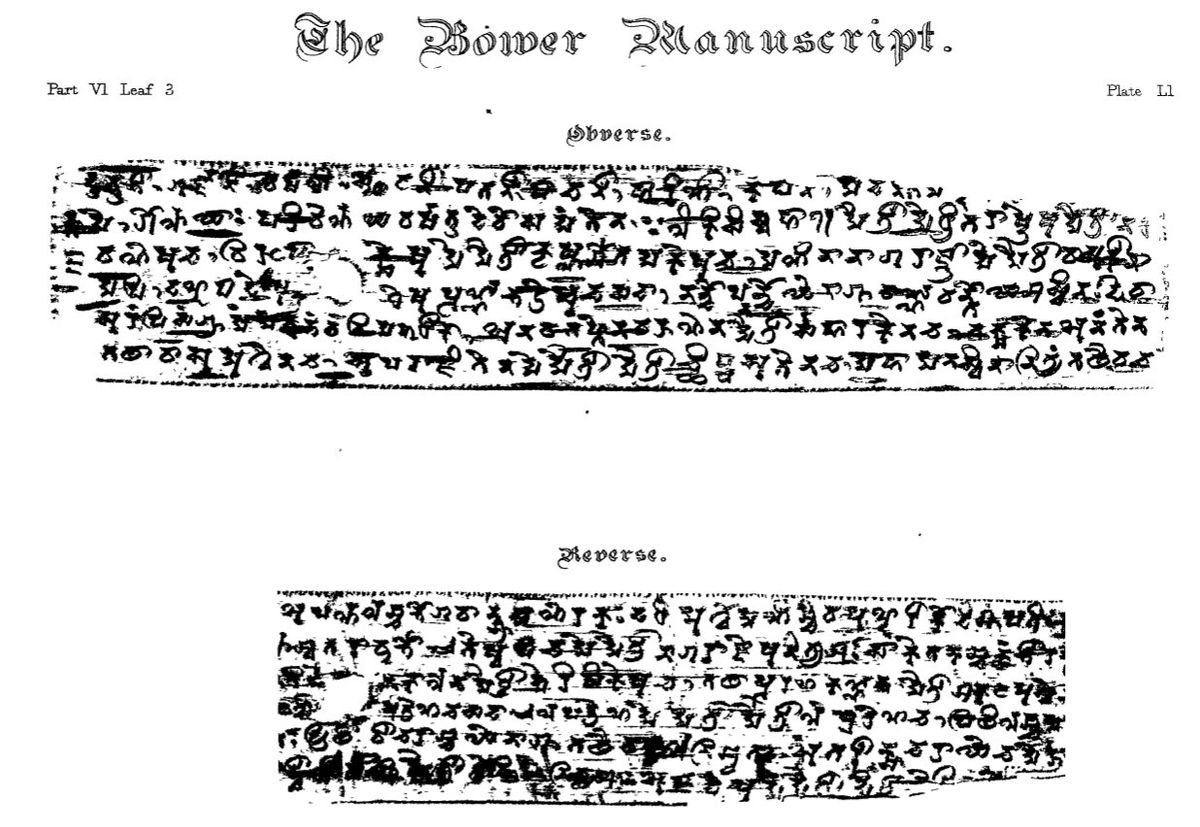Sushruta & his Samhita - Part 5 - Discovery of a Pothi (Bower Manuscript)

Look at the accompanying photo. Don’t they look like twins? Not quite twins, but they were maternal cousins as well as the heads of two of the most powerful empires of the 19th century. On the left is Tsar Nicholas II of Russia, and on the right is King George V of England.

George and Nicholas’ mothers, Alexandra and Dagmar, were sisters, which explains why they looked so alike
Their sibling rivalry reached dangerous proportions towards the end of the 19th century as they both embarked on what is now known as ‘“The Great Game’’.
The Great Game was a political and diplomatic confrontation that existed for most of the 19th century between the British Empire and the Russian Empire over Afghanistan and neighbouring territories in Central and Southern Asia. Russia was fearful of British commercial and military inroads into Central Asia, and Britain was fearful of Russia adding “the jewel in the crown”, India, to the vast empire that Russia was building in Asia. This resulted in an atmosphere of distrust and the constant threat of war between the two empires.¹
As if the competition between the two brothers was not enough, a third cousin joined the race. The Emperor of Germany — Kaiser William II. This Great Game and the perilous sibling rivalry culminated in the First World War, as the entire world bore the brunt of the ambition of these three cousins.
For the purpose of our story we do not need to go as far as the First World War, but only up to the year 1888.
Iran did not exist as the country it is today but was rather a conglomerate of several ruling factions. The Aamir’s had Ammirati and the Khans had Khanates. Neighbouring Afghanistan was hardly different from what it is today — without a centralised authority, or if there was one there were several opposing factions with constant infighting.
The deadly combination of the politics of the time resulted in these regions of the world being inundated with British, Russian, Turkish, and Afghani traders who moonlighted as spies for either England or Russia.

Under the guise of trade, these traders would travel in huge groups with lock, stock and barrel. This made them inconspicuous and spying easy. The information they were looking for was always regarding the military establishments, garrisons, where the army was stationed and what weapons they had, etc.
One such Scottish trader was Andrew Dalgliesh, who was also a British spy and married to a woman from the region of Yarkand. Dalgliesh was fluent in the local Udyur language making both trade and spying easy as he was able to fit in with the locals. He traded using the Leh — Ladakh route into Central Asia.
In March 1888, Dalgliesh was on one such trip passing through Leh. He was travelling in a large entourage of servants, as well as local pilgrims. Some time into this journey, a big robust Pathan by the name of Dowd Mohammed joined his group. Dowd was a trader himself in the early days but had lost his fortunes so was reduced to spying for the Russians.

Leh - Karakoram — Yarkand (This path appears walkable until Karakoram and not further these days)
On 8 April 1888, the group reached the Karakoram pass. Dalgliesh led them through the pass and set up his tent in the ice-laden valley ahead of the large entourage. It was almost evening by the time others made it through the pass and set up their tents. As people were setting up their camps and making tea to keep them warm in the chilly weather, Dalgliesh set out to help his fellow travellers. He made his way to the last tent which belonged to Dowd Mohammed. Dowd had just finished setting up the tent and invited Dalgliesh inside for a cuppa. In the middle of their small talk, about trade across the regions, Dowd abruptly got up to leave the tent. Dalgliesh asked where he was going, Dowd replied, “I’ll be right back”, and went outside.
Dalgliesh waited inside unsuspectingly. Unbeknownst to him, Dowd went out, picked up a rifle, and shot Dalgliesh from outside the tent. The bullet hit him on the shoulder as he fell to the floor in excruciating pain. Dowd then entered the tent with a sword. Dalgliesh tried to defend himself, scrambled out of the tent, and fell in the snow outside the tent. Dowd struck him with his sword, and in a few strikes, he hacked Dalgliesh to death.
All of this happened in full view of the other travellers who were shocked and remained mute witnesses to the incident. Dowd threatened others with the same fate if anyone opened their mouth to speak. By then it was nightfall, and Dowd helped himself to the dinner prepared by the shocked travellers, made his way to Dalgliesh’s tent, and spent a comfortable night on Dalgliesh’s bed. The following morning he made a getaway before others woke up, and in this way, a British spy was killed by a Russian spy.
As Dalgliesh was a British citizen, it was no surprise that the British government needed this murder investigated. So in the year 1889, they sent a British intelligence officer by the name of Hamilton Bower. Bower was sent to the Leh region for the investigation and to capture Dowd.

Imagine trying to capture one fugitive in the unforgiving and vast terrain of Central Asia!
Bower set off in the search of Dowd from Leh and reached the foothills of the Tian Shan Mountain, meaning the Mountains of Heaven — north and west of the Taklamakan Desert. He camped in the village of Kushar and decided to stay there for a few days to conduct his search.
It was in this village that he met a Turkish trader who told him that locals believed there was an ancient city buried under sand in the desert nearby. Curiosity got the best of the trader, and with his friend went looking for hidden treasures. All they found was an old book and nothing else. Bower asked to see the book.
An hour later the trader returned with the book, a handwritten ancient scripture called a Pothi. Bower purchased the Pothi from the trader for a paltry amount.
Those readers curious about what happened to Dowd… Using his extensive network of spies, Bower eventually cornered him near Samarkand and put him in prison where he mysteriously hung himself and died, but that is irrelevant to our story.
Bower built a memorial for Dalgliesh in Leh and returned to Bengal.
He handed the Pothi to the Asiatic Society of Bengal for further investigation because although prima facie the language in it appeared to be Sanskrit, it seemed indecipherable.
What was in this Pothi and how did it turn out to be Bower’s biggest and most significant purchase?
Let’s find out in the next chapter.
Join this fascinating journey to find out more.
Twitter: https://twitter.com/MitraDesai
Youtube: http://bit.ly/TejomayaBharat?sub_confirmation=1
Resources:
1: En.wikipedia.org. (2019). The Great Game. [online] Available at: https://en.wikipedia.org/wiki/The_Great_Game [Accessed 2 Aug. 2019].

Comments ()